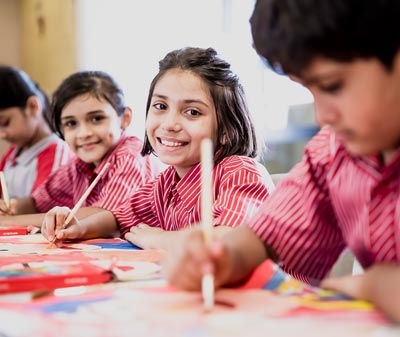Only curious minds can develop a deeper understanding and interpretation of answers to complex questions. One of the main aspects of learning is the interest taken for the unknown. Hence, the Primary Years Programme (PYP) has been selected as an educational framework based upon the findings of how young children learn.
Unlike many other programmes, the PYP helps students to understand their relationship and responsibility towards what they learn. Thereby, enabling the student to participate in a more engaging and meaningful manner of studying. For this, the concept of inquiry has been adopted as the prime feature of the programme. The different subjects are taught, as much as possible, in the context of units of inquiry where a positive sense of curiosity is created in the child.
The units provide a framework for focused inquiry by the whole class but also allow the students to follow their own inquiries. Therefore, the six transdisciplinary themes addressed each year at every grade level are outlined in this diagram:
What does this look and feel like in the classroom?
In the theme "How We Organize Ourselves", students may investigate a unit of inquiry in relation to their Community. In order to learn about how communities work, the students will be required to investigate and research the social, scientific and historical aspects of community life using their library and IT skills. They will be guided into using the key concepts to develop and ask questions, adding to their skills of inquiry and understanding.
Here is how learning will move across and cover the subject areas where teaching and studying become relevant, challenging, and purposeful.
Students will need to use their language and communication skills to share their ideas and to record their thoughts. They may be required to use their mathematical skills to create maps, collect data, or make graphs related to their findings about their community. IT may be used as a means of representing their data.
The Arts play a role as students express what they have learnt through drama, music and visual expression.
The purpose of the units of study
By focusing learning on the experiences and challenges shared by others, students are able to develop positive learning attitudes, interact with the world around them and take meaningful action. They therefore, develop a deeper understanding, a sense of personal responsibility and are encouraged to think as they acquire more knowledge.
The purpose of Assessment
Teachers continuously update their observations of student progress. Assessment criteria are discussed with students on an ongoing basis and are often published in the form of rubrics. Teacher feedback is explicitly related to transparent assessment criteria. All students in the school have a portfolio that is a clear reflection of their learning progress and the products they generate.
We communicate with parents
Parent Teacher conferences are held on a regular basis along with the following:
- End-of-term progress reports
- UOI evaluation reports
- Parent workshops
- Informal communication with teachers and the leadership team

